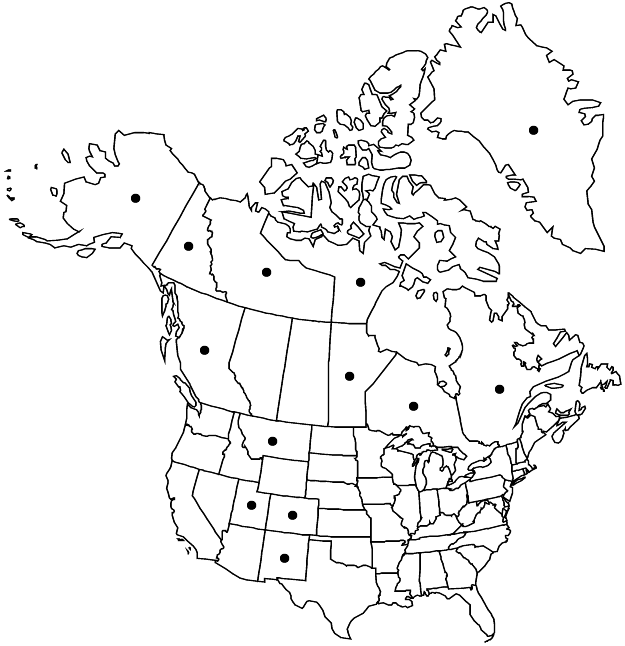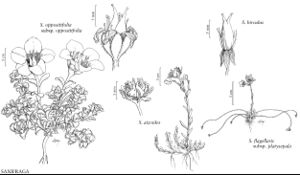Difference between revisions of "Saxifraga hirculus"
Sp. Pl. 1: 402. 1753 ,.
imported>Volume Importer |
imported>Volume Importer |
||
| Line 74: | Line 74: | ||
|publication year= | |publication year= | ||
|special status=Illustrated | |special status=Illustrated | ||
| − | |source xml=https:// | + | |source xml=https://bitbucket.org/aafc-mbb/fna-data-curation/src/2e0870ddd59836b60bcf96646a41e87ea5a5943a/coarse_grained_fna_xml/V8/V8_270.xml |
|genus=Saxifraga | |genus=Saxifraga | ||
|species=Saxifraga hirculus | |species=Saxifraga hirculus | ||
Latest revision as of 22:42, 5 November 2020
Plants loosely tufted, not stoloniferous or sometimes shortly so, rhizomatous, caudex present or not. Leaves basal and cauline, (distal clasping); petiole absent on distal leaves, otherwise ± flattened, 3–20(–35) mm; blade linear or linear-oblanceolate to spatulate, unlobed, (5–)10–30 mm, thin to slightly fleshy, margins entire, eciliate or sparsely reddish brown-ciliate, (with apical nonsecreting hydathode), apex acuminate or acute, surfaces glabrous or sparsely reddish brown-villous. Inflorescences 2(–4)-flowered cymes, sometimes solitary flowers, (flowers initially nodding), 4–30(–35) cm, sparsely to ± densely reddish brown-villous; bracts sessile. Flowers: sepals ascending to spreading, reflexed in fruit, (sometimes purplish), triangular, margins reddish brown-ciliate, surfaces glabrous (rarely reddish brown-hairy); petals yellow, often drying cream, often proximally orange-spotted, elliptic to oblong or obovate, 6–18 mm, 2+ times longer than sepals; ovary superior. 2n = 16, 24, 32.
Phenology: Flowering summer.
Habitat: Wet, usually mossy, arctic or alpine tundra, wet alpine meadows
Elevation: 0-4000 m
Distribution

Greenland, B.C., Man., N.W.T., Nunavut, Ont., Que., Yukon, Alaska, Colo., Mont., N.Mex., Utah, Eurasia, Atlantic Islands (Iceland, Spitsbergen).
Discussion
On the basis of a morphologic and cytologic study, O. Hedberg (1992) recognized four subspecies in Saxifraga hirculus: subsp. propinqua (2n = 16, 24), nearctic (Labrador and northwestern Greenland to Alaska); subsp. coloradoensis (2n = 16), Colorado; subsp. hirculus (2n = 32), circumboreal (Ontario to Alaska in North America); and subsp. compacta (2n = 32), mostly Arctic Eurasia, Atlantic Islands (Iceland, Spitsbergen), eastern Greenland, and Alaska. Nonetheless, we are not recognizing subspecies (see also P. K. Holmgren and N. H. Holmgren 1997); further research is needed to determine their validity.
Selected References
None.
